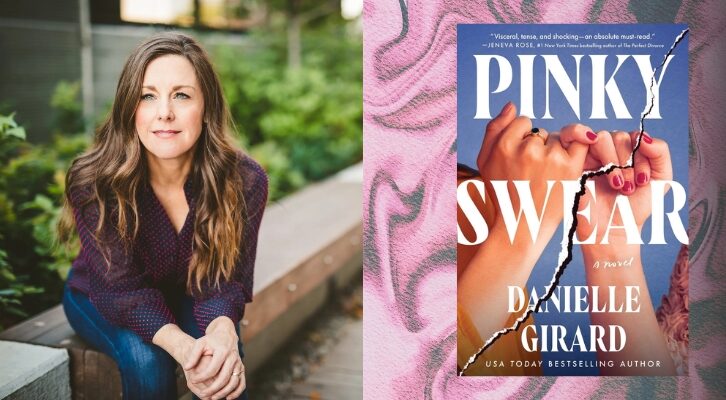
Serena Burdick on Her Novel’s Seventeen-Year Journey to Publication
“To survive, or at least to survive sanely, it takes a certain amount of endurance.”
Spring, 2005. I step off a bus, pull up the handle of my suitcase and bump it down the road into the town of Burford, England. I do not yet know that my character will take this same path, that her story—and the story of her great-great grandmother, Evelyn Aubrey—will follow me from my unsettled twenties to my comfortably settled forties. What I know, as I make my way down the cobblestones, is that I have ditched an acting career I spent ten years pursuing. I have chopped my hair impossibly short in rebellion to my theatrical agent who dropped me because I “wasn’t looking my best.” I have re-enrolled in college with no idea what I am doing with my life—which, at twenty-eight-years-old, feels tragic.
Emboldened by the setting, the sheep bleating in the fields and the manor on the hill, I dream up a different tragedy. I costume my protagonist, give her a backstory, make her a writer. I decided her name will be Evelyn, after my grandmother.
The following spring, I tell her story as a fictional thesis paper I write as a final credit for graduating from Brooklyn College. By now, the idea of turning Evelyn Aubrey’s story into an entire novel has wedged itself into my mind.
I have learned that the publishing industry is wildly unpredictable, that sometimes publishing your work comes down to a single person’s opinion.
That summer, married and pregnant with my first child, I sit in a sweltering room on Fire Island and write. I write that winter from a Swedish apartment with a baby on my lap and snow falling out my window. I write from my mother’s dining room table as my now one-year-old clangs blocks together. Pregnant again, I keep writing. I write while breastfeeding. I write exhausted. Sometimes, I sneak away and write in coffeeshops, or hide in the bathroom while my husband convinces the children I’m not in the house.
Five years, many moves, two children, one endlessly edited novel later, and I am finally done. While I wrote, I carefully avoided the reality that one needs an agent to sell a novel. Now, I let myself fully absorb the fact that I have, once again, chosen a career involving rejection, disappointment, and of course, the dreaded agent. The mere word “agent” makes my heart sink. It’s okay, I tell myself. It will be different this time. The book has its own identity. No one will care if it has a zit on its forehead, or if its eyes are puffy in the morning. I resolve to submit to ten agents a week for the rest of my life, if need be. Meanwhile, I’ll do the only thing in my control, which is to keep writing.
In a startlingly short amount of time, I receive an email from an agent who is so far out of my league her name in my inbox stuns me. I am giddy. I call my husband, my sister, my parents. I bask in the excitement. I’ve done it. This is it. This is the beginning of my writing career.
The next few months are full of exhilarating possibility until the rejections from editors start rolling in—flattering rejections—”Serena is an incredibly talented writer.” “Her prose is beautiful and engaging.” “Her voice is fresh and confident.” “It’s hard to believe this is her first novel.” But… “the story is diffuse.” “The desperate pieces don’t come together.” “The alternating perspectives don’t perfectly cohere.”
Okay, it needs work. I’ll rewrite it.
I do, but it still doesn’t sell.
Stubborn, determined, I start a new novel and wait for my agent to drop me. Weirdly, she remains exceedingly kind and committed. Why is she being so nice to me? I have failed her. Why isn’t she brushing me aside and moving on? It is after I send her my new manuscript, Girl in The Afternoon, that the dreaded email arrives from her assistant asking if we can to talk. Here it is. The respectful withdrawal. The I’m so sorry, we tried our best, but we can’t work with you.
I take the call outside of a coffeeshop in Santa Cruz. Slumped against the building, I watch sandaled surfers with cool hair walk by and feel my thirty-seven years of age. I’ve communicated with my agent’s assistant solely over email, and her voice strikes me as startlingly young. How old is she? I wonder, as she tells me how much she loved Girl in The Afternoon. She then explains that she’s being promoted from assistant to agent. Humbly, almost shyly, she asks if I would consider letting her represent me.
Relief washes over me—I’m not being dropped—as well as disappointment—I am losing my well-established agent—but also the flattering strange feeling of being respected. This woman is asking me if I am willing to work with her. Instead of telling me how it is going to be, my current agent is giving me agency, choice. By having her assistant ask me in this thoughtful, deferential way, she is saying, “your opinion matters.” Did I want to work with a young, savvy, new agent on the scene? Um, yes.
For the first time, it occurs to me that this book might never be published, which feels devastating.
Naturally, this decision is not without reservation—she is only twenty-six years old—but within months my ambitious new agent has sold my book. Her first, and mine. There is something particularly special about beginning our careers together. Something solid and immutable. She’s stuck with me now, I think.
I also think, The Stolen Book of Evelyn Aubrey, will finally be published! My agent thinks so too. I dive back into the lives of Evelyn and Abby and Lillian. I rewrite and edit, convinced that this will be the perfect second novel until my agent comes back and tells me that my editor wants me to make the entire book historical. “Cut the contemporary sections?” I balk. “That’s like, two thirds of the book? That’s the entire plotline!”
“I know,” my agent says. “Don’t worry. We’re not doing it. I have another editor in mind.”
Only, this editor isn’t interested either.
For the first time, it occurs to me that this book might never be published, which feels devastating. I love this book. I don’t want to give up on it.
Gently, my agent tells me to put it aside, for now. “Keep working on your next book,” she encourages.
My first publication did not go smoothly. My editor left her position before the book even made it to print, and it did not sell well. When I finish my next novel, The Girls with No Names, my agent suggests we leave my current publishing house and do a wide submission.
Months go by. My agent does not inform me of the rejections, but her silence is enough for me to discern that editors are passing on it. Finally, the call comes. An editor is interested. When this editor and I speak, I like the sound of her voice. Her vision aligns with mine, and even though I would take any offer that came my way, I feel lucky to work with her.
There is a small advance, and then, nothing. Months pass and I start to panic. What is happening? Why isn’t she editing my book? I later learn that my agent was shielding me from disaster to see where it would settle. My editor, shortly after acquiring my book, was offered a position at a new imprint. There was some commotion over her trying to take my book with her, and the publisher not wanting to let it go, but with some delicate negotiations, she managed to bring it along. The end result was, I still had my editor, but at a new imprint.
My agent did well keeping me in the dark. Losing an editor a second time might have done me in. I feel relieved, but weary of the whole process. At this point, all I hope is that my next book sells marginally more copies than the first.
Turns out, it sells tens of thousands more copies.
Remarkably, The Girls with No Names, becomes a bestseller. I am astounded, as one is, when a quiet book makes a bigger splash than anticipated.
Inevitably, my thoughts return to my beloved, first book. Surely, I can publish it now.
I wait for my agent to bring it up, but she doesn’t. When I finally do, she quietly says she thinks we should move ahead with a different novel idea I’ve pitched to her. “Maybe The Stolen Book will be your fourth novel,” she says, and something in her voice makes me doubtful. Does she not like the book anymore? Did she ever like it? Was she just being nice all these years? I begin to wonder if I love the book only because it was my first. Evelyn Aubrey is so real for me it’s hard to believe she doesn’t exist in history books. In some universe, Abigail is out there searching for her great-great-grandmother, while Evelyn pens her journal and waits for the truth to come out.
But maybe that’s just it. I have grown too close to them. Maybe I love them only because they have been with me for so long, and not because their stories are any good. What I have to do is appreciate the book for getting me to where I am, and let it go.
I decide not to bring it up again. I decide, once and for all, to move on.
I publish my third novel, Find Me in Havana, and write a proposal for my fourth. I’m excited about this fourth book. I’ve spent months researching Alaska, learning airplane terms and pilot lingo. I’ve written the first fifty pages. They’re good, and I feel hubristic and certain.
Maybe I love them only because they have been with me for so long, and not because their stories are any good.
“Your editor doesn’t feel this idea is quite strong enough,” my agent says. “But there’s good news. I pitched The Stolen Book of Evelyn Aubrey and she loves it.”
I am speechless. It’s like moving on from a lover who suddenly turns up on your doorstep and asks you to marry them. It this even what I want anymore?
Disentangling myself from the novel I’m currently working on, I drag The Stolen Book from its metaphorical drawer. I read fifteen-year-old sentences. How do I return to this? I am not the writer I was when I started. I am not the writer I was when I edited these pages seven years ago, or even five years ago when I gave it its last overhaul.
It is Evelyn who is unchanged. She sits right where I left her on a bench in a church green. She is a very patient character. Her journal, after all, is still waiting to be found.
We dive in again together. Painstakingly, I tear the book apart piece by piece. It’s like gutting an old house, each layer exposing more problems until the rot is swept away and fresh new words put into place. I rebuild. It is not easy. It might be the hardest writing task I have ever done, but also the most gratifying.
The book, born in one decade, emerges fully grown in another.
I can’t begin to predict what the next seventeen years will bring, but to finally be holding a printed copy of The Stolen Book of Evelyn Aubrey in my hands, fills me with the sensation of endless possibility. The pre-pub days vibrate with excitement, with hope and anxiety and expectation. Where ever this book lands, that it made it to publication after all these years, feels extraordinary.
I have learned that the publishing industry is wildly unpredictable, that sometimes publishing your work comes down to a single person’s opinion.
Finding value in the opinions of those who hold your career in their hands, while continuing to have faith in yourself, is a delicate balance. To survive, or at least to survive sanely, it takes a certain amount of endurance, a letting go, and a willingness to trust in the thing you love.
_____________________________________

The Stolen Book of Evelyn Aubrey by Serena Burdick is available from Park Row Books, an imprint of HarperCollins Publishers.
Serena Burdick
Serena Burdick graduated from The American Academy of Dramatic Arts in California before moving to New York City to pursue a degree in English Literature at Brooklyn College. Author of the National Bestseller The Girls with No Names, Find Me in Havana, and Girl in the Afternoon, she lives in Western Massachusetts with her husband and two sons.



















